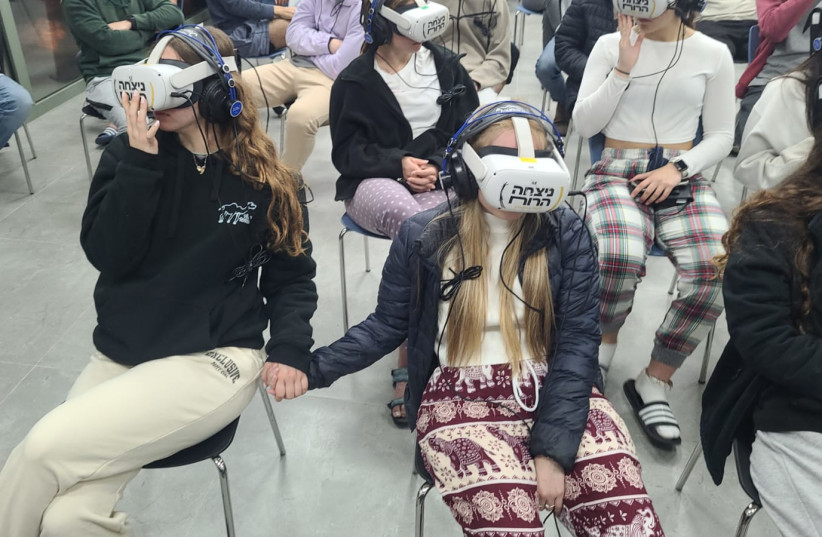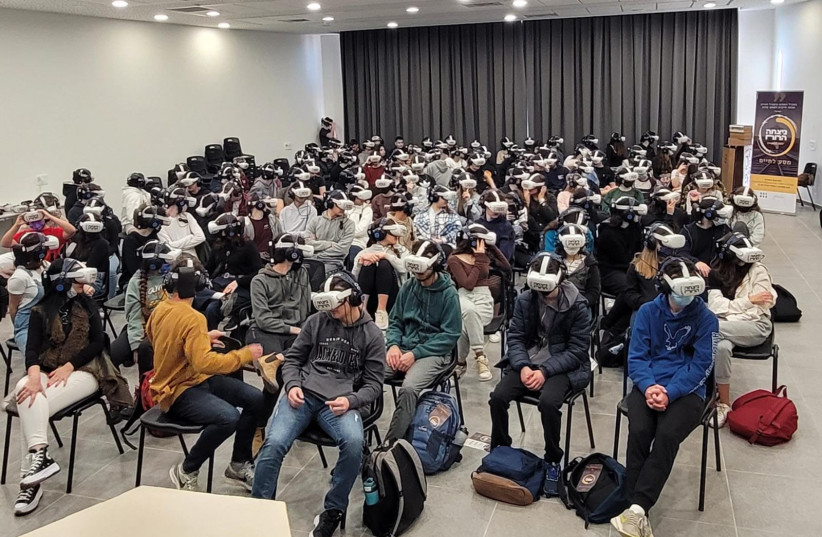Three female haredi (ultra-Orthodox) film-makers have launched a unique and ground-breaking technological movie that gives Israelis from all backgrounds an opportunity to feel as if they have visited Auschwitz through virtual reality (VR) technology.
When Miriam Cohen, a haredi woman from Modi’in Illit was growing up she was desperate to join her non-haredi friends who went on an educational tour to Poland through their high-school.
“I grew up in a neighborhood where many of my friends were religious Zionists, and they all flew to Poland as teenagers and experienced something that I felt I missed out on.”
Cohen explained that haredi schools don’t go on these educational tours to Poland, as do secular and religious Zionist schools, “I think its more of a cultural issue rather than a halachic problem.
“The mere idea of sending young students to a different country through their school is something unheard of.”

The haredi public is actually very connected to the Holocaust. It is often discussed and displayed in haredi media outlets and learned about in schools. But the issue of education and media about the Holocaust is far behind other sectors that can benefit from museums, films and literature.
Years later, Cohen and her two partners Hani Kopolowitz and Yuti Neumann were exposed to VR technology, and realized that they can actually create a virtual yet realistic tour for haredi students who will never visit the Auschwitz memorial site.
They produced a full-length film that displays a tour guide who takes them to all of the historic and important sights in the Auschwitz-Birkenau camp memorial. The venture is called “‘Nitzcha Ha’Ruach’ (Spirituality has Won); 360 degrees in Auschwitz.’’ The film is shown to groups of students across Israel using VR glasses.

“We grew up as ultra-Orthodox women from different backgrounds,” Cohen told The Jerusalem Post on Sunday. “My parents come from a Moroccan background and made aliyah from Montreal. My colleagues are from the Slonim and Gur hassidic groups,” she said, explaining that being from different haredi backgrounds helped them to market their product later on to a larger group of haredim.
Cohen told me that she and her colleagues have been involved in cinema in the haredi sector for many years. “We’ve created many movies for haredi women and work on different educational productions for ultra-Orthodox schools.
“Four years ago we were exposed to virtual reality technology during a project we produced. We all agreed it was time to bring VR to people who cannot travel to Poland, many of them being haredi, but also other groups.
”When I couldn’t convince my teachers and principal to let me go to Poland, it drove me crazy,” she remembers. “I felt that the Holocaust has become a part of my friends but not of myself. I felt as if I had a hole in my stomach.”
Hani Kopolowitz, one of the creators, a member of the Slonim hassidic group, shared with Cohen that she felt the same way. “The Rebbe of Slonim was murdered in the Holocaust,” Cohen explained. “The haredi public is so connected to the Holocaust but almost never visit the place where everything happened.”
The three women decided to learn how to use VR in film in order to fulfill their dream and create a full-length film in 360 degrees using VR glasses. But then they realized that there are no full-length movies in VR format.
“Everyone in the field of VR told us that the existing films in VR format are a maximum of 10 minutes,” Cohen explained. “Others told us that the idea of VR is to create interactive content that the user controls, not a group activity. We realized we had an accurate vision and that we had to do it alone.”
RESEARCHING VR TECHNOLOGY
They researched VR technology and bought a camera. “We did tests and we built the cinematic language of the film. We understood that it is a one-of-a-kind venture – in the aspect of the Holocaust for sure, but also this concept and language is supposedly new.”
The venture finally debuted about 10 months ago after a very difficult and complicated production, mainly because of Covid-19 and flight restrictions.
They hired a haredi tour-guide, a fascinating individual named Israel Goldwasser who takes the viewers on a tour to Poland’s once thriving and huge Jewish community and then to Auschwitz-Birkenau camp.
Goldwasser established a Holocaust memorial venture for haredim through the phone: thousands of stories, lectures and testimonials are available for anyone who wants to learn about the Holocaust and doesn’t use technology.
Cohen and her staff tried to speak to the head of the Auschwitz memorial museum in Poland but didn’t succeed because it was closed due to Covid-19. Even the offices weren’t operating.
“We spoke to Yad Vashem and they told me: We can help with whatever you need – except for money and the opening of the closed Auschwitz memorial,” she said.
“I was told by many people that ‘you won’t succeed in convincing the “square Poles” to let you in during the pandemic,’” Cohen said. “I turned to the Polish ambassador to Israel – he sent me a phone number and added that I shouldn’t expect them to answer.
“As a religious Jew, I raised my hands to the heavens and prayed. I told my girlfriends we would succeed to film in Auschwitz, even if we needed to take a boat to Poland,” she said. “I kept on getting different numbers till I finally reached a senior manager from the memorial who spoke French. I speak French since I’m a native of Montreal. I finally found someone I could have a dialogue with.”
They sent a draft of what they were thinking of filming in Auschwitz. When they were told there was a meeting about their venture in Poland, they lit candles and recited Psalms.
Cohen said that “I don’t care if you think we’re mystical or crazy. I felt there were six million Jews behind me and we prayed it would happen. We cried; we literally fell apart.”
Four hours later they got a phone call: “Come next Monday. The museum will be available for you for three days.” They booked many flights and connections since the flights were canceled due to the pandemic.
“It took us 24 hours to get to Poland instead of just a few hours,” she said. “We had a local guide who opened any room or site we wanted to see.” The three filmmakers and the Israeli tour guide were in luck. Because the museum was closed, they had a unique opportunity to film in Auschwitz when there were no tourists there.
“We were able to fly our glider from morning to night, which would never be allowed if there were tourists at the site. We thought that we would be focused on our work, but it was very difficult. The silence of Auschwitz brought us to tears all day for three days of filming,” she said.
“As mothers of children it was very powerful for us to experience Auschwitz. We tried to put all of these emotions into the film but anything that depresses the soul wasn’t included.”
Cohen explained that the point of their film isn’t to depress. “The film is still very painful, but it gives strength and hope.”
There is an ultra-Orthodox version of the movie that is an hour-and-a-half long and a shorter version of a bit more than an hour for the general public. There is an even shorter version for “people without patience,” Cohen said.
The venture was funded entirely by small investors and loans that they took from family and friends.
“We’ve had 20,000 viewers to date and it’s growing. There are eight screenings a day during this week of Holocaust Remembrance Day,” she said. They own 200 VR glasses; Cohen claims that they are the largest owners of this product in Israel, and so they also rent them out for extra income.
A dubbed version of the film will debut in English in about a month and later on there will be versions in French and Russian.
Were there any haredi groups that were against your film?
“Yes, there was only one real criticism from a serious group – from the Gur hassidut. They are against the use of these types of technological products and therefore won’t let their constituents use smartphones. We have a special compromise with Gur: We offer them an option to screen the film on a round screen – and therefore they don’t need to use the VR glasses.
“There were others in the haredi world that were initially against our initiative, but once they watched the movie, they realized they were wrong,” Cohen said. “We hope to not only display this movie for haredi students but also to many groups around Israel and the world.”
